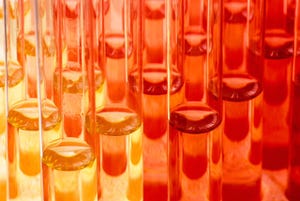A Blood Test for Diagnosing Depression
September 22, 2014
A method of detecting depression in adults from blood could be the first objective way to diagnose the condition, which affects almost 1 in 10 people in the United States according to the CDC.
The test could be truly revolutionary. While depression has become more widely diagnoses over the past few decades, its diagnosis is often based on vague criteria. WebMD, for instance, notes that doctors look to diagnose the condition by asking patients to self report "sadness or depressed mood most of the day or almost every day" or "loss of enjoyment in things that were once pleasurable."
Recently Eva Redei, a professor of psychiatry and behavioral sciences at Northwestern University's Feinberg School of Medicine, has developed a test which could point towards an objective method of detecting depression. In addition, the method could also help improve doctors and mental health experts ability to identify which type of therapies will work best.
A study supporting the test is underway at Northwestern University's Feinberg School of Medicine, as researchers have identified nine RNA blood markers that can be used as part of a panel to diagnose the mental disorder. The study included 32 patients who had been independently diagnosed with depression in a clinical interview, along with 32 non-depressed patients as a control group. The study found the nine RNA blood markers at significantly different levels in the patients diagnosed with depression than in those in the control group.
According to the Anxiety and Depression Association of America, almost 15 million Americans suffer from major depression each year, however diagnosing depression can take anywhere from two to 40 months, resulting in delayed treatments. The hope is that this test could provide a more timely, accurate manner with which to diagnose the mental condition, accelerating both treatment and therapy.
"This clearly indicates that you can have a blood-based laboratory test for depression, providing a scientific diagnosis in the same way someone is diagnosed with high blood pressure or high cholesterol," she said. "This test brings mental health diagnosis into the 21st century and offers the first personalized medicine approach to people suffering from depression."
Redei previously worked on a different kind of blood test to help diagnose adolescent depression, citing that many of the markers that indicate depression in children were much different than the markers on the adult depression panel. This could eventually pave the way for doctors to test individuals early in childhood, as well as into adulthood for severe depression.
Of course there is still a lof research left to be done for Redei and her team. Researchers plan to continue to test the panel on larger population sizes, as they continue to gather data and refine the method. The team indicated that the study was supported by grants from the National Institute of Mental Health, and the U.S. National Institute of Health.
Redei is still hopeful that identifying the presence of depression is just the beginning. Researchers maintain hopeful that the test can not only help identify depression and therapy solutions, but also help distinguish between major depression and bipolar depression.
As we move forward into the realm of mental health discovery, Redei and her team look to establish some of the early building blocks of mental health diagnosis, helping us live healthier lives both physically and mentally.
Refresh your medical device industry knowledge at MD&M Chicago, October 15-16, 2014, and MD&M Minneapolis, October 29-30, 2014. |
Kristopher Sturgis is a contributor to Qmed and MPMN.
Like what you're reading? Subscribe to our daily e-newsletter.
About the Author(s)
You May Also Like


